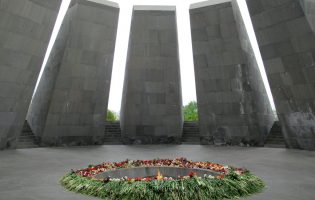
President Biden’s Recognition of the 1915 Armenian Genocide
Will the German Government Follow? On April 24, 2021, President Joe Biden recognized as a genocide the mass killings by the crumbling Ottoman Empire of 1.5 million Armenians, beginning in …

The Diplomacy of Genocide
President Biden’s Recognition of the Armenian Genocide On the 106th anniversary of the Armenian genocide, April 24, 2021, President Biden issued a statement honoring the memory of Armenians who perished. …
“Out-Cirlik”: After months of tensions, domestic pressure drives German cabinet to vacate Turkey’s Incirlik Airbase diminishing support for assault on Raqqa
German-Turkish relations, experiencing their fair share of turbulence in the past months, reached a new low last Wednesday when Chancellor Angela Merkel’s cabinet decided to redeploy some 260 German soldiers …

Dealing with the Past in Spaces, Places, Actions, and Institutions of Memory: Conference
The meeting, supported by the Stiftung Mercator and organized by the American-German Institute and Hafıza Merkezi, comprised three different, related elements: a traditional conference of presentations and discussion; a series …
Trilateral Dialogue between Germany, the U.S., and Turkey: Turkey’s EU Accession – Endless Negotiations?
After a flurry of enlargement in the early twenty-first century, the European Union may now be encountering enlargement fatigue. After receiving the Nobel Peace Prize in 2012 in recognition of …
Recent Authors
AGI provides knowledge, insights, and networks as tools to solve the challenges ahead.
Support Our WorkKnocking on Germany’s Door
There may be a lot of grumbling in parts of Europe about German arrogance in dealing with the euro crisis, but it has not interfered with record numbers of people …
Plotting Parameters of Partnership: Turkey, Germany and Europe.
The Turkish Prime Minister Recep Tayyip Erdoğan opened a new Embassy in Berlin this week and used that platform to assert not only Germany’s importance for Turkey, but also to …
Is the Arab Spring a Turning Point in EU-Turkey Relations?
Many thought the Arab Spring would be a turning point not only across the Middle East region, but also in relations with its neighbors. Rana Deep Islam argues that the …
Turkey and Germany – Stable Economies, Stable Ties?
In Turkey and Germany – Stable Economies, Stable Ties?, Humboldt University graduate student and former AICGS intern Ursula Moffitt explains the political and economic path Turkey has taken to become a “model” country in the region. According to Ms. Moffitt, because of the relative stability and success in Turkey in recent years, Germany should look to strengthen the “privileged partnership” it shares with Turkey in the wake of the current euro zone crisis.
50 Years After: What Germany and Turkey Need is a State Treaty
In his essay 50 Years After: What Germany and Turkey Need is a State Treaty, Rana Deep Islam, Ph.D. student at Erlangen University and former DAAD/AICGS Fellow, reflects on the current state of German citizens with a Turkish background following the 50th anniversary of the guest workers agreement between Germany and Turkey. According to Mr. Islam, while German politics have been slow to fully welcome Turkish integration, Berlin must act quickly to forge stronger ties with Ankara.
Two Face Diplomacy – The Turkish-Israeli Clash Contradicts Ankara’s Foreign Policy Principles
Following Israel’s refusal to apologize for last year’s attack on a Gaza Aid Flotilla, Turkey has cut diplomatic ties with Tel Aviv. According to former AICGS Fellow Rana Islam, Turkey’s decision goes completely against their “zero problems” agenda and further threatens an already unstable region. However, all hope may not yet be lost.
Turkey After the Elections – Where is it Heading?
While prevailing opinion delivered by most of Germany’s newspapers labeled the Turkish election results as a major setback for Prime Minister Recep Tayyip Erdogan’s AKP party, looking at the numbers will quickly make it clear that the AKP is far from legitimately being considered the election’s loser writes DAAD/AICGS Fellow Rana Deep Islam. Mr. Islam examines the election results and argues that the outcome will have a significant impact on Turkey’s foreign policy strategies in dealing with the greater Middle East.




